牛津译林版8B语法知识点汇总
- 格式:doc
- 大小:273.50 KB
- 文档页数:17
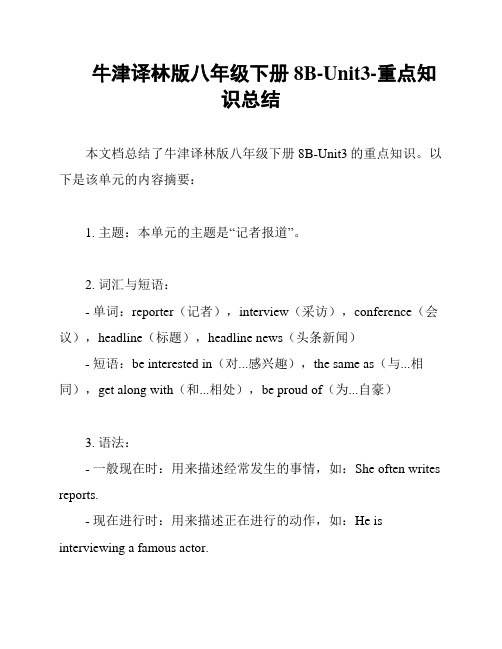
牛津译林版八年级下册8B-Unit3-重点知识总结本文档总结了牛津译林版八年级下册8B-Unit3的重点知识。
以下是该单元的内容摘要:1. 主题:本单元的主题是“记者报道”。
2. 词汇与短语:- 单词:reporter(记者),interview(采访),conference(会议),headline(标题),headline news(头条新闻)- 短语:be interested in(对...感兴趣),the same as(与...相同),get along with(和...相处),be proud of(为...自豪)3. 语法:- 一般现在时:用来描述经常发生的事情,如:She often writes reports.- 现在进行时:用来描述正在进行的动作,如:He is interviewing a famous actor.- 一般过去时:用来描述过去发生的事情,如:The reporter interviewed the mayor yesterday.4. 阅读理解:本单元共有两篇阅读理解,题目分别是“Interview with a Celebrity”和“A Day in the Life of a News Reporter”。
这两篇文章讲述了记者采访名人和新闻记者的工作日常。
5. 语言点:- 名词性从句:如:I know what you said.- 形容词性从句:如:The news is interesting because it is about a famous actor.- 定语从句:如:The boy who is talking to the reporter is my friend.以上是牛津译林版八年级下册8B-Unit3的重点知识总结,希望对你有帮助。
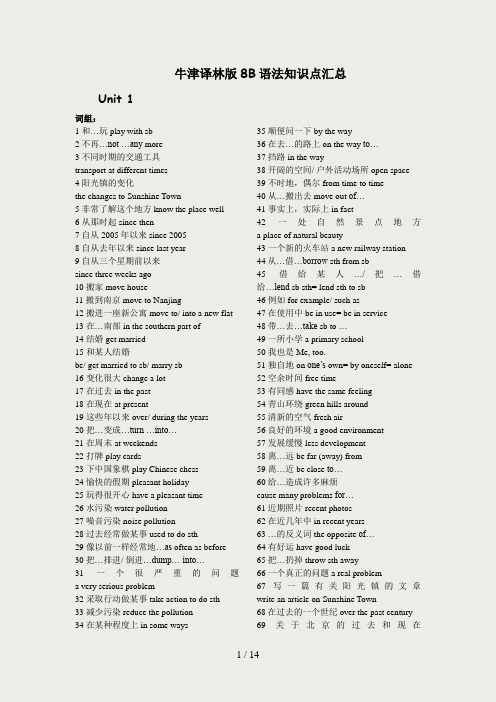
牛津译林版8B语法知识点汇总Unit 1词组:1 和…玩play with sb2 不再…not…any more3 不同时期的交通工具transport at different times4 阳光镇的变化the changes to Sunshine Town5 非常了解这个地方know the place well6 从那时起since then7 自从2005年以来since 20058 自从去年以来since last year9 自从三个星期前以来since three weeks ago10 搬家move house11 搬到南京move to Nanjing12 搬进一座新公寓move to/ into a new flat13 在…南部in the southern part of14 结婚get married15 和某人结婚be/ get married to sb/ marry sb16 变化很大change a lot17 在过去in the past18 在现在at present19 这些年以来over/ during the years20 把…变成…turn…into…21 在周末at weekends22 打牌play cards23 下中国象棋play Chinese chess24 愉快的假期pleasant holiday25 玩得很开心have a pleasant time26 水污染water pollution27 噪音污染noise pollution28 过去经常做某事used to do sth29 像以前一样经常地…as often as before30 把…排进/ 倒进…dump…into…31 一个很严重的问题a very serious problem32 采取行动做某事take action to do sth33 减少污染reduce the pollution34 在某种程度上in some ways 35 顺便问一下by the way36 在去…的路上on the way to…37 挡路in the way38 开阔的空间/ 户外活动场所open space39 不时地,偶尔from time to time40 从…搬出去move out of…41 事实上,实际上in fact42 一处自然景点地方a place of natural beauty43 一个新的火车站a new railway station 44从…借…borrow sth from sb45借给某人…/把…借给…lend sb sth= lend sth to sb46 例如for example/ such as47 在使用中be in use= be in service48 带…去…take sb to …49 一所小学a primary school50 我也是Me, too.51 独自地on one’s own= by oneself= alone52 空余时间free time53 有同感have the same feeling54 青山环绕green hills around55 清新的空气fresh air56 良好的环境a good environment57 发展缓慢less development58 离…远be far (away) from59 离…近be close to…60 给…造成许多麻烦cause many problems for…61 近期照片recent photos62 在近几年中in recent years63 …的反义词the opposite of…64 有好运have good luck65 把…扔掉throw sth away66 一个真正的问题a real problem67 写一篇有关阳光镇的文章write an article on Sunshine Town68在过去的一个世纪over the past century 69关于北京的过去和现在about Beijing’s past and present 70感冒have a cold71 患重感冒have a bad cold72 受到某人的来信hear from sb= receive a letter from73 乘飞机旅行travel by plane/ by air74 享受阳光和沙滩enjoy the sun and the beach语法:现在完成时(I)我们用现在完成时表示从过去持续到现在的动作或状态,或已完成但对现在有一定影响的活动。
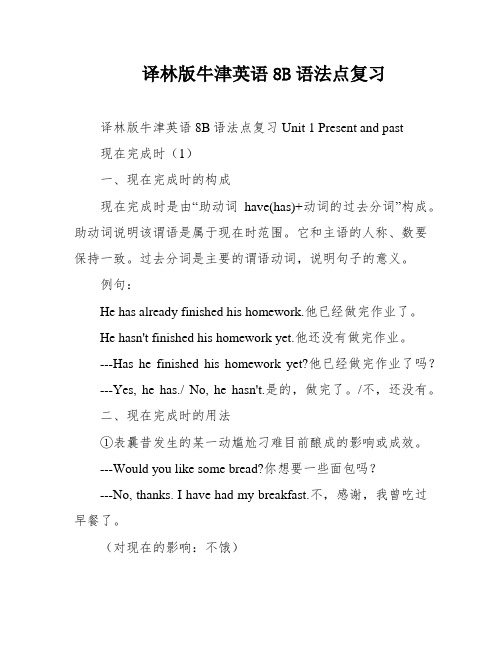
译林版牛津英语8B语法点复习译林版牛津英语8B语法点复习Unit 1 Present and past现在完成时(1)一、现在完成时的构成现在完成时是由“助动词have(has)+动词的过去分词”构成。
助动词说明该谓语是属于现在时范围。
它和主语的人称、数要保持一致。
过去分词是主要的谓语动词,说明句子的意义。
例句:He has already finished his homework.他已经做完作业了。
He hasn't finished his homework yet.他还没有做完作业。
---Has he finished his homework yet?他已经做完作业了吗?---Yes, he has./ No, he hasn't.是的,做完了。
/不,还没有。
二、现在完成时的用法①表曩昔发生的某一动尴尬刁难目前酿成的影响或成效。
---Would you like some bread?你想要一些面包吗?---No, thanks. I have had my breakfast.不,感谢,我曾吃过早餐了。
(对现在的影响:不饿)---Why don't you drive to your office?你为甚么不开车去办公室啊?---Because my car has broken.因为我的车坏了。
(对目前的影响:车没举措开了)①表示从过去开始一直持续到现在,也许还会继续下去的动作或状态。
He has studied English for 6 years.他已经研究英语六年了。
Mary has been busy since she came back from Hangzhou.自从从杭州回来,玛丽一直在忙。
3、常和目前完成时连用的工夫状语①用副词already和yet。
already一般用于一定句中,yet 一般用于否定句和疑问句中。
We have already finished our homework.我们已完成作业了。

一、重点词汇【短语归纳】business出差 for动身去few 几个,一些 has been to去过…from来自 other互相a fantastic time玩得开心 whole day -整天underground乘地铁 coaster(游乐场的)过山车high speed高速 as例如photos拍照 some shopping购物couple of一对;几个,几件 fun玩得开心the end of在……末尾 front of在……的前面about ……怎么样 20. how long 多久,多长时间back回来 22. winter holiday寒假at看…… 24. be away from离开…25. half an hour半小时 26.in spring在春天27.all year round终年,一年四季 28.theme park主题公园29. by the way顺便问一下 30. three and a half hours二个半小时31. some day将来的某一天 32. on the way在路上33. get excited变得激动 34. later in the afternoon下午晚些时候35. run after 追赶 the fireworks在烟火下37. have gone to去了...,. 38.have a look看一看39.attend a meeting开会,出席会议 for a picnic去野餐41. a member of……的一员 Gardens中国园林43.natural beauty天然美景 44. fly to飞往……cold and snowy days在寒冷的下雪的日子里the lake在湖边 visit to South Hill南山之旅stop doing sth 忍不住做某事 at high speed 高速移动a direct flight 直飞 May Day holiday 五一节假期二、重要句型1.Can I join you我可以和你一起去吗join用作及物动词,意为“加入”,表示加入某一组织、党派、社会团体或某一人群中,从而成为其成员。
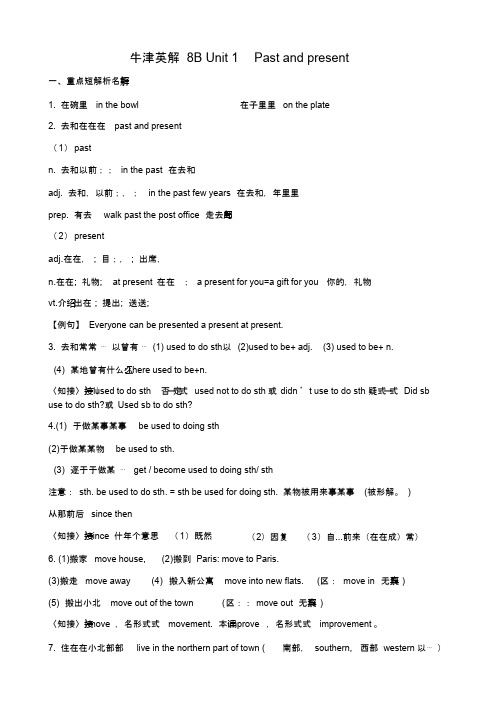

牛津初中英语8B unit1—unit8 知识点归纳8B Unit1【考点精讲】一、核心词汇1.past n.[考点点拨] past作名词,意为“过去〞,其还可作介词和形容词,可用于如下情况:in the past 〔n.〕在过去;half past(prep.)five 5点半;in the past(adj.)three years在过去的3年里。
如:When he walks past our desks, he always knocks ourbooks and pens off the desks.当他走过我们课桌的时候,他总是把我们的书本和钢笔从课桌上碰掉下来。
The boy finished his homework with the help of his fatherin the past.这个男孩过去是在他父亲的帮助下完成作业的。
2.present n.[考点点拨]present作名词,意为“现在,目前〞。
At present=at the moment=right now目前;其还可作形容词,your present job你目前的工作;present用作名词,还可表示“礼物〞,a birthday present -份生日礼物。
如:He iswashing his clothes at present.现在他正在洗衣服。
3.northern adj。
[考点点拨] 方位词:north-northern; west-western; south-southern; east-eastern。
如:in the north of China =in the northern part of China在中国北部East China华东;North China华北The northern part of the city used to be sparselypopulated, but has now bee a cultural centre.城北过去人口稀少,但现在成了文化中心。
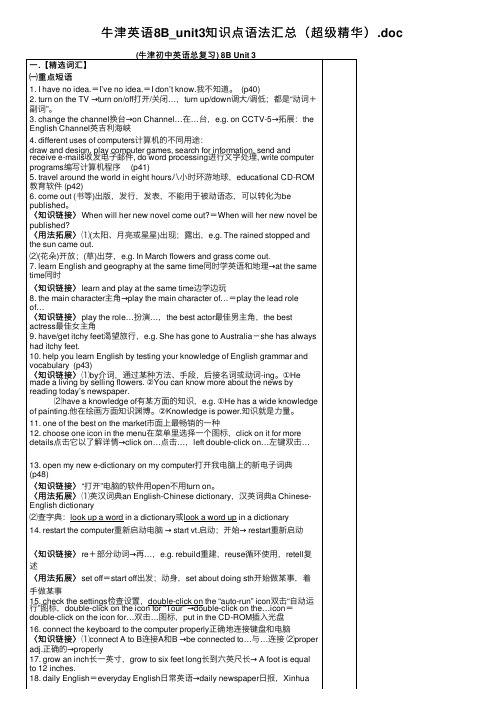
⽜津英语8B_unit3知识点语法汇总(超级精华).doc(⽜津初中英语总复习) 8B Unit 3⼀.【精选词汇】 ㈠重点短语 1. I have no idea.=I’ve no idea.=I don’t know.我不知道。
(p40) 2. turn on the TV →turn on/off打开/关闭…,turn up/down调⼤/调低;都是“动词+副词”。
3. change the channel换台→on Channel…在…台,e.g. on CCTV-5→拓展:theEnglish Channel英吉利海峡 4. different uses of computers计算机的不同⽤途: draw and design, play computer games, search for information, send andreceive e-mails收发电⼦邮件, do word processing进⾏⽂字处理, write computerprograms编写计算机程序 (p41) 5. travel around the world in eight hours⼋⼩时环游地球,educational CD-ROM教育软件 (p42) 6. come out (书等)出版,发⾏,发表,不能⽤于被动语态,可以转化为bepublished。
〈知识链接〉When will her new novel come out?=When will her new novel bepublished? 〈⽤法拓展〉⑴(太阳、⽉亮或星星)出现;露出,e.g. The rained stopped and〈⽤法拓展〉the sun came out. ⑵(花朵)开放;(草)出芽,e.g. In March flowers and grass come out. 7. learn English and geography at the same time同时学英语和地理→at the sametime同时 〈知识链接〉learn and play at the same time边学边玩 8. the main character主⾓→play the main character of…=play the lead roleof… 〈知识链接〉play the role…扮演…,the best actor最佳男主⾓,the bestactress最佳⼥主⾓ 9. have/get itchy feet渴望旅⾏,e.g. She has gone to Australia-she has alwayshad itchy feet. 10. help you learn English by testing your knowledge of English grammar andvocabulary (p43) 〈知识链接〉〈知识链接〉⑴by介词,通过某种⽅法、⼿段,后接名词或动词-ing。

牛津初中英语8B unit1—unit8 知识点归纳8B Unit1【考点精讲】一、核心词汇1.past n.[考点点拨]past作名词,意为“过去”,其还可作介词和形容词,可用于如下情况:in the past(n.)在过去;half past(prep.)five 5点半;in the past(adj.)three years在过去的3年里。
如:When he walks past our desks, he always knocks ourbooks and pens off the desks.当他走过我们课桌的时候,他总是把我们的书本和钢笔从课桌上碰掉下来。
The boy finished his homework with the help of his father in the past.这个男孩过去是在他父亲的帮助下完成作业的。
2.present n.[考点点拨]present作名词,意为“现在,目前”。
At present=at the moment=right now 目前;其还可作形容词,your present job你目前的工作;present用作名词,还可表示“礼物”,a birthday present -份生日礼物。
如:He is washing his clothes at present.现在他正在洗衣服。
3.northern adj。
[考点点拨] 方位词:north-northern; west-western; south-southern; east-eastern。
如:in the north of China = in the northern part of China在中国北部East China华东;North China华北The northern part of the city used to be sparsely populated, but has now bee a cultural centre.城北过去人口稀少,但现在成了文化中心。

牛津初中英语8B unit1—unit8 知识点归纳8B Unit1【考点精讲】一、核心词汇1.past n.[考点点拨] past作名词,意为“过去”,其还可作介词和形容词,可用于如下情况:in the past (n.)在过去;half past(prep.)five 5点半;in the past(adj.)three years在过去的3年里。
如:When he walks past our desks, he always knocks ourbooks and pens off the desks.当他走过我们课桌的时候,他总是把我们的书本和钢笔从课桌上碰掉下来。
The boy finished his homework with the help of his father in the past.这个男孩过去是在他父亲的帮助下完成作业的。
2.present n.[考点点拨]present作名词,意为“现在,目前”。
At present=at the moment=right now目前;其还可作形容词,your present job你目前的工作;present用作名词,还可表示“礼物”,a birthday present -份生日礼物。
如:He is washing his clothes at present.现在他正在洗衣服。
3.northern adj。
[考点点拨] 方位词:north-northern; west-western; south-southern; east-eastern。
如:in the north of China =in the northern part of China在中国北部East China华东;North China华北The northern part of the city used to be sparsely populated, but has now become a cultural centre. 城北过去人口稀少,但现在成了文化中心。
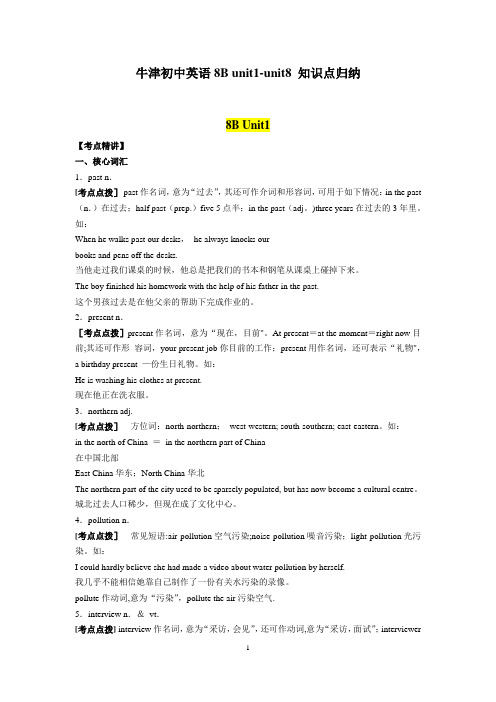
牛津初中英语8B unit1-unit8 知识点归纳8B Unit1【考点精讲】一、核心词汇1.past n.[考点点拨]past作名词,意为“过去”,其还可作介词和形容词,可用于如下情况:in the past (n.)在过去;half past(prep.)five 5点半;in the past(adj。
)three years在过去的3年里。
如:When he walks past our desks,he always knocks ourbooks and pens off the desks.当他走过我们课桌的时候,他总是把我们的书本和钢笔从课桌上碰掉下来。
The boy finished his homework with the help of his father in the past.这个男孩过去是在他父亲的帮助下完成作业的。
2.present n.[考点点拨]present作名词,意为“现在,目前"。
At present=at the moment=right now目前;其还可作形容词,your present job你目前的工作;present用作名词,还可表示“礼物",a birthday present —份生日礼物。
如:He is washing his clothes at present.现在他正在洗衣服。
3.northern adj.[考点点拨]方位词:north-northern;west-western; south-southern; east-eastern。
如:in the north of China =in the northern part of China在中国北部East China华东;North China华北The northern part of the city used to be sparsely populated, but has now become a cultural centre。

重点短语过去和现在past and present过去常常做某事,曾经做某事used to do sth.过去常常是……,曾经是……used to be + n./adj.习惯于做某事,适应于做某事be/get used to doing sth.习惯于…,适应于…be/get used to + 名词或代词被用来做某事(被动语态) be used to do sth.不同时期的运输工具transport at different times过去常常骑自行车去学校used to go to school by bike= used to ride the bike to school环游城市go around the city搬家move house搬到某地move to sp搬离(某地)move away (from sp.)(从某地)搬出来move out (of sp.)搬进新的公寓move into the new flats住在镇北live in the northern part of town= live in the north of town结婚(动作)/ 结婚(状态)get married / be married (adj.) 和某人结婚 get/be married with sb嫁给某人/ 娶某人marry (vt.) sb.把A嫁给B marry A to B对…..很了解know …very well从那时起since then在几年间改变很多change a lot over the years搬到两个街区远的地方move two blocks away在镇中心in the town centre = in the centre of town把A变成B turn A into B= change A into B把镇中心的部分地方变成一个新地方turn part of the town centre into a new park把废弃物倒进河里put the waste into the river意识到这个问题realize the problem采取行动改善这个情况take action to improve the situation一家钢铁厂/ 两家钢铁厂 a steel factory / two steel factories在某些方面,在某种程度上in some ways通过很多方法in many ways打牌下中国象棋play cards and Chinese chess感到有点寂寞feel a bit lonely= feel a little lonely一座偏远的山村 a lonely mountain village独自生活live alone有时,偶尔,间或,时不时地from time to time = at times = sometimes像以前一样经常/频繁as often as before采访某人have an interview (n.) with sb.= interview (vt.) sb.一生(从出生到死或到现在)all one’s life / all ones' lives在过去的世纪over the past century到现在为止 till/until now变成一个现代化的小镇become a modern town 乘公交车进出小镇travel to and from the town by bus居住环境living conditions天气状况weather condition当地人local people从美国回来 return from the USA = come back from America回到某地去 return to sp = go back to spreturn sth. to sb. = give sth. back to sb.火车站the railway station去国外,出国go abroad上一次互相见面last see each other (adv.)主要通过邮件联系mainly communicate by email和某人交流communicate with sb. = have a communication with sb.使联系变得容易多了make communication much easier和某人保持联系keep in touch with sb.(河流)流过,流经run through独自on one’s own = by oneself = alone到处是垃圾 rubbish everywhere两边都是绿色green trees on both sides在一些宽阔的空地in some large open spaces 狭窄和脏的马路narrow and dirty roads享受舒服的生活enjoy a comfortable life重点句子:1. —Have you seen my food? 你见到过我的食物了吗?—Yes, I have just eaten it. 是的,我刚刚吃了它。
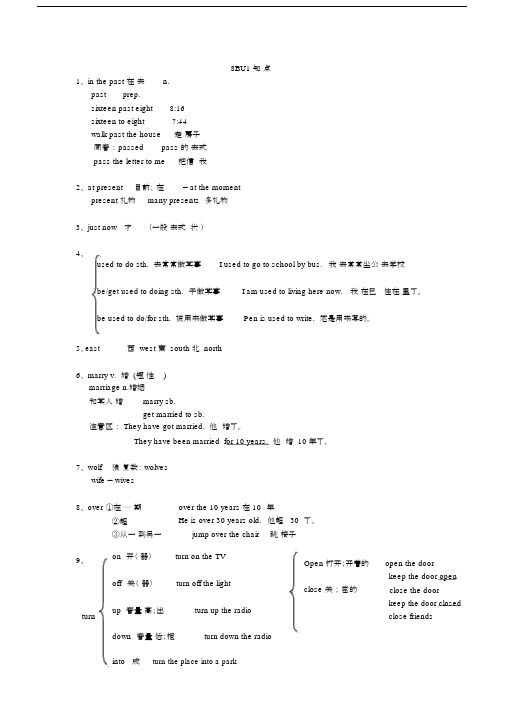
8BU1 知点1、 in the past 在去n.past prep.sixteen past eight8:16sixteen to eight7:44walk past the house走房子同音: passed pass 的去式pass the letter to me把信我2、 at present目前;在= at the momentpresent 礼物many presents 多礼物3、 just now 才(一般去式状)4、used to do sth. 去常常做某事I used to go to school by bus.我去常常坐公去学校be/get used to doing sth.于做某事I am used to living here now.我在已住在里了。
be used to do/for sth. 被用来做某事Pen is used to write. 笔是用来写的。
5、east西 west 南 south 北 north6、 marry v. 婚 (短性 )marriage n.婚姻和某人婚marry sb.get married to sb.注意区: They have got married. 他婚了。
They have been married for 10 years. 他婚 10 年了。
7、 wolf狼复数: wolveswife — wives8、 over ①在⋯⋯期over the 10 years 在 10年②超He is over 30 years old.他超 30 了。
③从一到另一jump over the chair跳椅子9、on开(器)turn on the TV Open 打开;开着的open the dooroff关(器)turn off the lightkeep the door open close 关;密的close the doorup音量高;出turn up the radio keep the door closedturn close friends down音量低;拒turn down the radiointo 成turn the place into a park10、 pollution n.[U]染much pollutionpollute v. 染pollute the river染小河a polluted river一条被染的小河11、 waste n.[U] 物too much wastev.浪waste time 浪waste water 浪水12、 realize one’s dream 某人的梦想realize my dream 我的梦想n.realization 意13、 improve v. 提高 ;改善n. [C]improvementimprove the environment改善境14、in one’s way 某人的路;妨碍Don’tbe in my way.不要妨碍我。
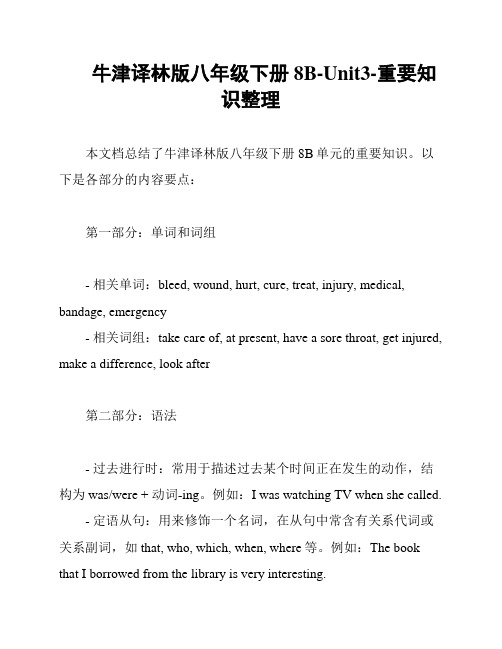
牛津译林版八年级下册8B-Unit3-重要知
识整理
本文档总结了牛津译林版八年级下册8B单元的重要知识。
以下是各部分的内容要点:
第一部分:单词和词组
- 相关单词:bleed, wound, hurt, cure, treat, injury, medical, bandage, emergency
- 相关词组:take care of, at present, have a sore throat, get injured, make a difference, look after
第二部分:语法
- 过去进行时:常用于描述过去某个时间正在发生的动作,结构为was/were + 动词-ing。
例如:I was watching TV when she called.
- 定语从句:用来修饰一个名词,在从句中常含有关系代词或关系副词,如that, who, which, when, where等。
例如:The book that I borrowed from the library is very interesting.
第三部分:阅读理解
本单元的阅读理解主要涉及健康和医疗方面的话题,如急救知识、保持健康的方法等。
文章包括多个题目和相关问题,需要通过阅读文章来回答问题。
第四部分:写作
本单元的写作部分要求学生描述自己或他人的一次意外事故,并分享如何应对和处理这种情况。
学生应使用过去进行时和定语从句等语法知识来描述事件,并提出建议和解决办法。
以上是牛津译林版八年级下册8B单元重要知识的整理。
希望对您有所帮助!。

牛津初中英语8B unit1—unit8 知识点归纳8B Unit1【考点精讲】一、核心词汇1.past n.[考点点拨]past作名词,意为“过去",其还可作介词和形容词,可用于如下情况:in the past(n.)在过去;half past(prep.)five 5点半;in the past(adj.)three years在过去的3年里。
如:When he walks past our desks,he always knocks ourbooks and pens off the desks.当他走过我们课桌的时候,他总是把我们的书本和钢笔从课桌上碰掉下来。
The boy finished his homework with the help of his father in the past。
这个男孩过去是在他父亲的帮助下完成作业的。
2.present n.[考点点拨]present作名词,意为“现在,目前”.At present=at the moment=right now目前;其还可作形容词,your present job你目前的工作;present用作名词,还可表示“礼物”,a birthday present —份生日礼物。
如:He is washing his clothes at present.现在他正在洗衣服。
3.northern adj.[考点点拨]方位词:north-northern; west-western;south-southern; east—eastern.如:in the north of China =in the northern part of China在中国北部East China华东;North China华北The northern part of the city used to be sparsely populated, but has now become a cultural centre。

牛津译林版英语八年级下册-8B-Unit1-知识点总结汇总Oxford English 8B Unit 1: Past and PresentKey Phrases:1.In the bowl/on the plate2.Past and presentPastNoun: The time before now。
in the pastAdjective: XXX place in the past。
in the past few yearsn: Having gone by。
walk past the post officePresentAdjective: Existing or occurring now。
presentNoun: The present time。
at present。
a present for you = a gift for youVerb: Introduce。
appear。
offer。
presentXXX sentence: XXX XXX with a present at present.ed to do something。
Used to be + adjective/noun。
There used to be + nounUsed to do something: Past XXXNegative form: Used not to do something or didn't use to do somethingn form: Did someone use to do something。
or Used someone to do something?4.Be used to doing something。
Be used to something。
Get/e used to doing something/somethingNote: XXX is used to do something = Something is used for doing something (passive voice)5.Since thenSince has several meanings: (1) Since。
牛津译林版8B语法知识点汇总Unit 1词组:1 和…玩play with sb2 不再…not…any more3 不同时期的交通工具transport at different times4 阳光镇的变化the changes to Sunshine Town5 非常了解这个地方know the place well6 从那时起since then7 自从2005年以来since 20058 自从去年以来since last year9 自从三个星期前以来since three weeks ago10 搬家move house11 搬到南京move to Nanjing12 搬进一座新公寓move to/ into a new flat13 在…南部in the southern part of14 结婚get married15 和某人结婚be/ get married to sb/ marry sb16 变化很大change a lot17 在过去in the past18 在现在at present19 这些年以来over/ during the years20 把…变成…turn…into…21 在周末at weekends22 打牌play cards23 下中国象棋play Chinese chess24 愉快的假期pleasant holiday25 玩得很开心have a pleasant time26 水污染water pollution27 噪音污染noise pollution28 过去经常做某事used to do sth29 像以前一样经常地…as often as before30 把…排进/ 倒进…dump…into…31 一个很严重的问题a very serious problem32 采取行动做某事take action to do sth33 减少污染reduce the pollution34 在某种程度上in some ways35 顺便问一下by the way 36 在去…的路上on the way to…37 挡路in the way38 开阔的空间/ 户外活动场所open space39 不时地,偶尔from time to time40 从…搬出去move out of…41 事实上,实际上in fact42 一处自然景点地方a place of natural beauty43 一个新的火车站a new railway station 44从…借…borrow sth from sb45借给某人…/把…借给…lend sb sth= lend sth to sb46 例如for example/ such as47 在使用中be in use= be in service48 带…去…take sb to …49 一所小学a primary school50 我也是Me, too.51 独自地on one’s own= by oneself= alone52 空余时间free time53 有同感have the same feeling54 青山环绕green hills around55 清新的空气fresh air56 良好的环境a good environment57 发展缓慢less development58 离…远be far (away) from59 离…近be close to…60 给…造成许多麻烦cause many problems for…61 近期照片recent photos62 在近几年中in recent years63 …的反义词the opposite of…64 有好运have good luck65 把…扔掉throw sth away66 一个真正的问题a real problem67 写一篇有关阳光镇的文章write an article on Sunshine Town68在过去的一个世纪over the past century 69关于北京的过去和现在about Beijing’s past and present70感冒have a cold71 患重感冒have a bad cold72 受到某人的来信hear from sb= receive a letter from 73 乘飞机旅行travel by plane/ by air74 享受阳光和沙滩enjoy the sun and the beach语法:现在完成时(I)我们用现在完成时表示从过去持续到现在的动作或状态,或已完成但对现在有一定影响的活动。
如:He has lived here since he came to Nanjing. 自从来到南京,他就住在这里。
I have lost my mobile phone. 我的手机丢了。
现在完成时常和already、ever、just、never、recently、yet等副词以及since、for引导的时间状语连用。
如:He has already taken first prize twice.他已经拿过两次一等奖了。
He has not returned the book to me yet. 他还没有把那本书还给我。
He has never visited the Great Wall. 他从没去过长城。
注意:already常用于肯定句,意思是“已经”,而yet常用于否定句和疑问句,意思是“还”。
现在完成时的动词构成:have/ has + 动词的过去分词大多数动词的过去分词变化形式同动词的过去式,可参照动词的过去式变化规则。
不规则动词的过去分词变化:有些动词的过去分词和过去式的变化形式相同,其变化情况大致分类如下:有些动词的过去分词和过去式的变化不同,其变化大致分类如下:Unit 2 词组:1 到…作一次旅行go on a trip to…2 一定很有趣must be great fun3 带…出去几天take …out for a few days4 把…带在身边bring sth with sb5 快点;加油come on6 旅游景点tourist attractions7 …的象征a symbol of…8 去滑雪go skiing9 去远足go hiking10 看美丽的风景see the beautiful view11 拍照take photos12 欢迎到…welcome to…13 写信给…write to sb14 玩得很高兴have a fantastic time15 整天the whole day16 乘地铁by underground17 在入口处at the entrance18 高速运行move at high speed19 一家快餐店a fast food restaurant20 对…感兴趣be interested in21 不停地拍照ca't stop taking photos22 迪斯尼人物的游行a parade of Disney characters23 下午晚些时候later in the afternoon24 一天中最精彩的部分the best part of the day25 向…挥手致意wave to …26 一路上all the way27 像魔术一样be like magic28 精彩的狮王表演the great 'Lion King' show29 买一些纪念品buy some souvenirs30 在…结束时at the end of…31 观看烟火watch fireworks32 在烟火映衬下看起来很闪亮look shiny and beautiful under the fireworks33 一共,总计in all34 一次刺激的旅行an exciting trip35 把某物给某人看show sth to sb36 一队人a line of people37 排队等候wait in line38 一次有意义的经历a meaningful experience39 一次真得令人高兴的假日a really delightful holiday40 多姿多彩的服饰colourful costumes41 …一名成员a member of…42 到深圳旅游travel to Shengzhen43 全年all year around44 在即将到来的假日in the coming holiday45 依次/轮流做某事take turns to do sth46 计划出国旅游plan to travel abroad47 希望做某事hope to do sth48 希望某人做某事wish sb to do sth49 飞往某地fly to …50 新鲜的空气fresh air51 宜人的天气pleasant weather52 名胜古迹places of interest53 我们去香港旅游的日子the day of our trip to Hongkong54 三个半小时three and a half hours= three hours and a half55 鸟瞰香港的景色have a bird’s-eye view of Hongkong56 一座高楼耸立、夜晚灯光闪烁的现代化城市a modern city of tall buildings with lights shin ing in the evening57 文化中心cultural centre语法:现在完成时(II)have/ has been和have/ has gone的用法●我们用have/ has been表示某人曾经去过某地,并且已经回来。
如:He has been to the Great Wall twice. 他曾经去过长城两次。
We have never been to the South Hill. 我们还从来没有去过南山。
●我们用have/ has gone表示某人已经去了某地,但还没回来。
如:He has gone to London. He will be back in two weeks.他已经去了伦敦了。
他将在两周后回来。
-Is Tom at home? 汤姆在家吗?-No, he isn’t. He has gone to the cinema. 不在,他去看电影了。
和for或since连用的动词现在完成时常和for或since引导的表示一段时间的时间状语连用。